- Home
- Lauren Oliver
Delirium dt-1 Page 2
Delirium dt-1 Read online
Page 2
“Got it,” I say. A bus barrels past us. The crest for St. Anne’s Academy is stenciled along its side and I duck my head quickly, imagining Cara McNamara or Hillary Packer staring out the dirt-encrusted windows, giggling and pointing at me. Everyone knows I am having my evaluation today. Only four are offered throughout the year, and slots are determined well in advance.
The makeup Aunt Carol insisted I wear makes my skin feel coated and slick.
In the bathroom mirror at home, I thought I looked like a fish, especially with my hair all pinned with metal bobby pins and clips: a fish with a bunch of metal hooks sticking in my head.
I don’t like makeup, have never been interested in clothes or lip gloss. My best friend, Hana, thinks I’m crazy, but of course she would. She’s absolutely gorgeous—even when she just twists her blond hair into a messy knot on the top of her head, she looks as though she’s just had it styled. I’m not ugly, but I’m not pretty, either. Everything is in-between. I have eyes that aren’t green or brown, but a muddle. I’m not thin, but I’m not fat, either. The only thing you could definitely say about me is this: I’m short.
“If they ask you, God forbid, about your cousins, remember to say that you didn’t know them well…”
“Uh-huh.” I’m only half listening. It’s hot, too hot for June, and sweat is pricking up already on my lower back and in my armpits, even though I slathered on deodorant this morning. To our right is Casco Bay, which is hemmed in by Peaks Island and Great Diamond Island, where the lookout towers are. Beyond that is open ocean—and beyond that, all the crumbling countries and cities ruined by the disease.
“Lena? Are you even listening to me?” Carol puts a hand on my arm and spins me in her direction.
“Blue,” I parrot back at her. “Blue is my favorite color. Or green.” Black is too morbid; red will set them on edge; pink is too juvenile; orange is freakish.
“And the things you like to do in your free time?”
I gently slip away from her grasp. “We’ve gone over this already.”
“This is important, Lena. Possibly the most important day of your whole life.”
I sigh. Ahead of me the gates that bar the government labs swing open slowly with a mechanized whine. There is already a double line forming: on one side, the girls, and fifty feet away, at a second entrance, the boys. I squint against the sun, trying to locate people I know, but the ocean has dazzled me and my vision is clouded by floating black spots.
“Lena?” my aunt prompts me.
I take a deep breath and launch into the spiel we’ve rehearsed a billion times.
“I like to work on the school paper. I’m interested in photography because I like the way it captures and preserves a single moment of time. I enjoy hanging out with my friends and attending concerts at Deering Oaks Park. I like to run and was a co-captain of the cross-country team for two years. I hold the school record in the 5K event. I often babysit the younger members of my family, and I really like children.”
“You’re making a face,” my aunt says.
“I love children,” I repeat, plastering a smile on my face. The truth is, I don’t like very many children except for Gracie. They’re so bumpy and loud all the time, and they’re always grabbing things and dribbling and wetting themselves.
But I know I’ll have to have children of my own someday.
“Better,” Carol says. “Go on.”
I finish, “My favorite subjects are math and history,” and she nods, satisfied.
“Lena!”
I turn around. Hana is just climbing out of her parents’ car, her blond hair flying in wisps and waves around her face, her semi-sheer tunic slipping off one tan shoulder. All the girls and boys lining up to enter the labs have turned to watch her. Hana has that kind of power over people.
“Lena! Wait!” Hana continues barreling down the street, waving at me frantically. Behind her, the car begins a slow revolution: back and forth, back and forth, in the narrow drive until it is facing the opposite direction. Hana’s parents’ car is as sleek and dark as a panther. The few times we’ve driven around in it together I’ve felt like a princess. Hardly anyone has cars anymore, and even fewer have cars that actually drive. Oil is is strictly rationed and extremely expensive. Some middle-class people keep cars mounted in front of their houses like statues, frigid and unused, the tires spotless and unworn.
“Hi, Carol,” Hana says breathlessly, catching up to us. A magazine pops out of her half-open bag, and she stoops to retrieve it. It’s one of the government publications, Home and Family, and in response to my raised eyebrows she makes a face. “Mom made me bring it. She said I should read it while I’m waiting for my evaluation. She said it will give the right impression.” Hana sticks her finger down her throat and mimes gagging.
“Hana,” my aunt whispers fiercely. The anxiety in her voice makes my heart skip. Carol hardly ever loses her temper, even for a minute. She whips her head in both directions, as though expecting to find regulators or evaluators lurking in the bright morning street.
“Don’t worry. They’re not spying on us.” Hana turns her back to my aunt and mouths to me, Yet. Then she grins.
In front of us, the double line of girls and boys is growing longer, extending into the street, even as the glass-fronted doors of the labs swoosh open and several nurses appear, carrying clipboards, and begin to usher people into the waiting rooms. My aunt rests one hand on my elbow lightly, quick as a bird.
“You’d better get on line,” she says. Her voice is back to normal. I wish some of her calmness would rub off on me. “And Lena?”
“Yeah?” I don’t feel very well. The labs look far away, so white I can hardly stand to look at them, the pavement shimmering hot in front of us. The words most important day of your life keep repeating in my head. The sun feels like a giant spotlight.
“Good luck.” My aunt does her one-millisecond smile.
“Thanks.” I kind of wish Carol would say something else—something like, I’m sure you’ll do great, or Try not to worry—but she just stands there, blinking, her face composed and unreadable as always.
“Don’t worry, Mrs. Tiddle.” Hana winks at me. “I’ll make sure she doesn’t screw up too badly. Promise.”
All my nervousness dissipates. Hana is so relaxed about the whole thing, so nonchalant and normal.
Hana and I go down toward the labs together. Hana is almost five-nine.
When I walk next to her I have to do a half skip every other step to keep up with her, and I wind up feeling like a duck bobbing up and down in the water. Today I don’t mind, though. I’m glad she’s with me. I’d be a complete wreck otherwise.
“God,” she says, as we get close to the lines. “Your aunt takes this whole thing pretty seriously, huh?”
“Well, it is serious.” We join the back of the line. I see a few people I recognize: some girls I know vaguely from school; some guys I’ve seen playing soccer behind Spencer Prep, one of the boys’ schools. A boy looks my way and sees me staring. He raises his eyebrows and I drop my eyes quickly, my face going hot all at once and a nervous itch working in my stomach. You’ll be paired in less than three months, I tell myself, but the words don’t mean anything and seem ridiculous, like one of the Mad Libs games we played as children that always resulted in nonsensical statements: I want banana for speedboat. Give my wet shoe to your blistering cupcake.
“Yeah, I know. Trust me, I’ve read The Book of Shhh as much as anyone.”
Hana pushes her sunglasses up onto her forehead and bats her eyelashes at me, making her voice supersweet: “‘Evaluation Day is the exciting rite of passage that prepares you for a future of happiness, stability, and partnership.’” She drops her sunglasses back down on her nose and makes a face.
“You don’t believe it?” I lower my voice to a whisper.
Hana has been strange recently. She was always different from other people—more outspoken, more independent, more fearless. It’s one of the reasons I fir
st wanted to be her friend. I’ve always been shy, and afraid that I’ll say or do the wrong thing. Hana is the opposite.
But lately it’s been more than that. She’s stopped caring about school, for one thing, and has been called to the principal’s office several times for talking back to the teachers. And sometimes in the middle of talking she’ll stop, just shut her mouth as though she’s run up against a barrier. Other times I’ll catch her staring out at the ocean as though she’s thinking of swimming away.
Looking at her now, at her clear gray eyes and her mouth as thin and taut as a bowstring, I feel a tug of fear. I think of my mother floundering for a second in the air before dropping like a stone into the ocean; I think about the face of the girl who dropped from the laboratory roof all those years ago, her cheek turned against the pavement. I will away thoughts of the illness. Hana isn’t sick. She can’t be. I would know.
“If they really want us to be happy, they’d let us pick ourselves,” Hana grumbles.
“Hana,” I say sharply. Criticizing the system is the worst offense there is.
“Take it back.”
She holds up her hands. “All right, all right. I take it back.”
“You know it doesn’t work. Look how it was in the old days. Chaos all the time, fighting, and war. People were miserable.”
“I said, I take it back.” She smiles at me, but I’m still mad and I look away.
“Besides,” I go on, “they do give us a choice.”
Usually the evaluators generate a list of four or five approved matches, and you are allowed to pick among them. This way, everyone is happy. In all the years that the procedure has been administered and the marriages arranged, there have been fewer than a dozen divorces in Maine, less than a thousand in the entire United States—and in almost all those cases, either the husband or wife was suspected of being a sympathizer and divorce was necessary and approved by the state.
“A limited choice,” she corrects me. “We get to choose from the people who have been chosen for us.”
“Every choice is limited,” I snap. “That’s life.”
She opens her mouth as though she’s going to respond, but instead she just starts to laugh. Then she reaches down and squeezes my hand, two quick pumps and then two long ones. It’s our old sign, a habit we developed in the second grade when one of us was scared or upset, a way of saying, I’m here, don’t worry.
“Okay, okay. Don’t get defensive. I love the evaluations, okay? Long live Evaluation Day.”
“That’s better,” I say, but I’m still feeling anxious and annoyed. The line shuffles slowly forward. We pass the iron gates, with their complicated crown of barbed wire, and enter the long driveway that leads to the various lab complexes.
We are headed for Building 6-C. The boys go to 6-B, and the lines begin to curve away from each other.
As we move closer to the front of the line, we get a blast of air-conditioning every time the glass doors slide open and then hum shut. It feels amazing, like being momentarily dipped head to toe in a thin sheet of ice, popsicle-style, and I turn around and lift my ponytail away from my neck, wishing it weren’t so damn hot. We don’t have air-conditioning at home, just tall, gawky fans that are always sputtering out in the middle of the night. And most of the time Carol won’t even let us use those; they suck up too much electricity, she says, and we don’t have any to spare.
At last there are only a few people in front of us. A nurse comes out of the building, carrying a stack of clipboards and a handful of pens, and begins distributing them along the line.
“Please make sure to fill out all required information,” she says, “including your medical and family history.”
My heart begins to work its way up into my throat. The neatly numbered boxes on the page—Last Name, First Name, Middle Initial, Current Address, Age—collapse together. I’m glad Hana is in front of me. She begins filling out the forms quickly, resting the clipboard on her forearm, her pen skating over the paper.
“Next.”
The doors whoosh open again, and a second nurse appears and gestures for Hana to come inside. In the dark coolness beyond her, I can see a bright white waiting room with a green carpet.
“Good luck,” I say to Hana.
She turns and gives me a quick smile. But I can tell she is nervous, finally.
There is a fine crease between her eyebrows, and she is chewing on the corner of her lip.
She starts to enter the lab and then turns abruptly and walks back to me, her face wild and unfamiliar-looking, grabbing me with both shoulders, putting her mouth directly to my ear. I’m so startled I drop my clipboard.
“You know you can’t be happy unless you’re unhappy sometimes, right?”
she whispers, and her voice is hoarse, as though she’s just been crying.
“What?” Her nails are digging into my shoulders, and at that moment I’m terrified of her.
“You can’t be really happy unless you’re unhappy sometimes. You know that, right?”
Before I can respond she releases me, and as she pulls away, her face is as serene and beautiful and composed as ever. She bends down to scoop up my clipboard, which she passes to me, smiling. Then she turns around and is gone behind the glass doors, which open and close behind her as smoothly as the surface of water, sucking closed over something that is sinking.
Chapter Four
The devil stole into the Garden of Eden.
He carried with him the disease—amor deliria nervosa—in the form of a seed. It grew and flowered into a magnificent apple tree, which bore apples as bright as blood.
— From Genesis: A Complete History of the World and the Known Universe, by Steven Horace, PhD, Harvard University
By the time the nurse admits me into the waiting room, Hana is gonevanished down one of the antiseptic white hallways and whisked behind one of the dozens of identical white doors—although there are about a half-dozen other girls milling around, waiting. One girl is sitting in a chair, hunched over her clipboard, scribbling and crossing out her answers, and then rescribbling. Another girl is frantically asking a nurse about the difference between “chronic medical conditions” and “pre-existing medical conditions.” She looks like she’s on the verge of having some kind of fit—a vein is standing out on her forehead and her voice is rising hysterically—and I wonder whether she’s going to list a tendency toward excessive anxiety on her sheet.
It’s not funny, but I feel like laughing. I bring my hand to my face, snorting into my palm. I tend to get giggly when I’m extremely nervous. During tests at school I’m always getting in trouble for laughing. I wonder if I should have marked that down.
A nurse takes my clipboard from me and flips through the pages, checking to see that I haven’t left any answers blank.
“Lena Haloway?” she says in the bright, clipped voice that all nurses seem to share, like it’s part of their medical training.
“Uh-huh,” I say, and then quickly correct myself. My aunt has told me that the evaluators will expect a certain degree of formality. “Yes. That’s me.” It’s still strange to hear my real name, Haloway, and a dull feeling settles at the bottom of my stomach. For the past decade I’ve gone by my aunt’s name, Tiddle.
Even though it’s a pretty stupid last name—Hana once said it reminded her of a little-kid word for peeing—at least it isn’t associated with my mother and father.
At least the Tiddles are a real family. The Haloways are nothing but a memory.
But for official purposes I have to use my birth name.
“Follow me.” The nurse gestures down one of the hallways, and I follow the neat tick-tock of her heels down the linoleum. The halls are blindingly bright.
The butterflies are working their way up from my stomach into my head, making me feel dizzy, and I try to calm myself by imagining the ocean outside, its ragged breathing, the seagulls turning pinwheels in the sky.
It will be over soon, I tell myself. It will be over so
on and then you’ll go home, and you’ll never have to think about the evaluation again.
The hallway seems to go on forever. Up ahead a door opens and shuts, and a moment later, as we turn a corner, a girl brushes past us. Her face is red and she’s obviously been crying. She must be done with her evaluation already. I recognize her, vaguely, as one of the first girls admitted.
I can’t help but feel sorry for her. Evaluations typically last anywhere from half an hour to two hours, but it’s common wisdom that the longer the evaluators keep you, the better you’re doing. Of course, that isn’t always true. Two years ago Marcy Davies was famously in and out of the lab in forty-five minutes, and she scored a perfect ten. And last year Corey Winde scored an all-time record for longest evaluation—three and a half hours—and still received only a three.
There’s a system behind the evaluations, obviously, but there’s always a degree of randomness to them too. Sometimes it seems the whole process is designed to be as intimidating and confusing as possible.
I have a sudden fantasy of running through these clean, sterile hallways, kicking in all the doors. Then, immediately, I feel guilty. This is the worst of all possible times to be having doubts about the evaluations, and I mentally curse Hana. This is her fault, for saying those things to me outside. You can’t be happy unless you’re unhappy sometimes. A limited choice. We get to choose from the people who have been chosen for us.
I’m glad the choice is made for us. I’m glad I don’t have to choose—but more than that, I’m glad I don’t have to make someone else choose me. It would be okay for Hana, of course, if things were still the way they were in the old days.
Hana, with her golden, halo hair, and bright gray eyes, and perfect straight teeth, and her laugh that makes everyone in a two-mile radius whip around and look at her and laugh too. Even clumsiness looks good on Hana; it makes you want to reach out a hand to help her or scoop up her books. When I trip on my own feet or spill coffee down the front of my shirt, people look away. You can almost see them thinking, What a mess. And whenever I’m around strangers my mind goes fuzzy and damp and gray, like streets starting to thaw after a hard snow—unlike Hana, who always knows just what to say.

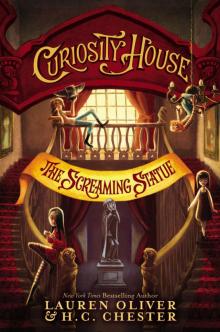 The Screaming Statue
The Screaming Statue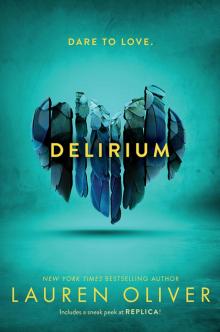 Delirium
Delirium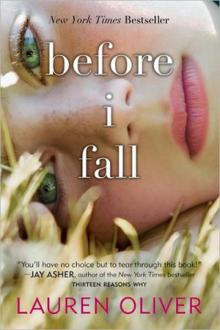 Before I Fall
Before I Fall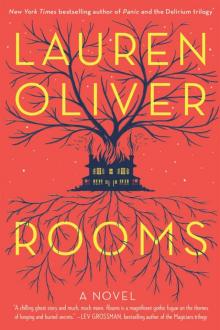 Rooms
Rooms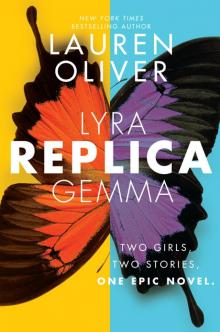 Replica
Replica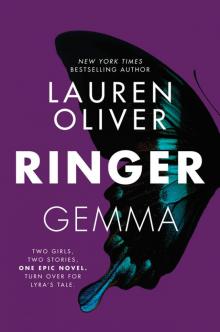 Ringer
Ringer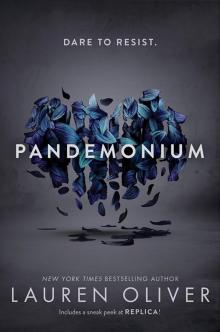 Pandemonium
Pandemonium The Shrunken Head
The Shrunken Head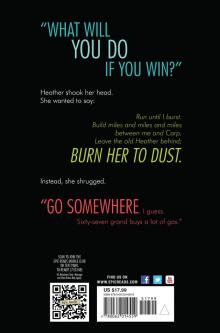 Panic
Panic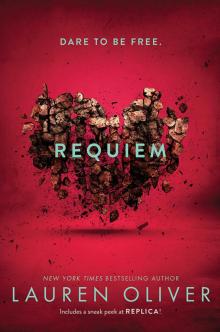 Requiem
Requiem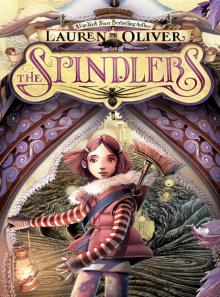 The Spindlers
The Spindlers Annabel
Annabel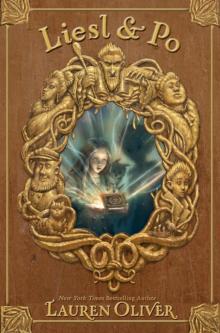 Liesl & Po
Liesl & Po Raven
Raven Alex
Alex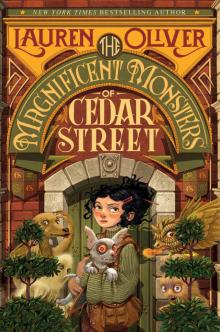 The Magnificent Monsters of Cedar Street
The Magnificent Monsters of Cedar Street Vanishing Girls
Vanishing Girls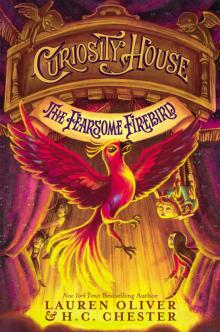 The Fearsome Firebird
The Fearsome Firebird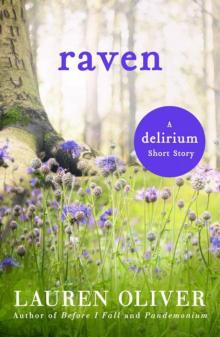 Raven: A Delirium Short Story
Raven: A Delirium Short Story Annabel: A Delirium Short Story
Annabel: A Delirium Short Story Hana: A Delirium Short Story
Hana: A Delirium Short Story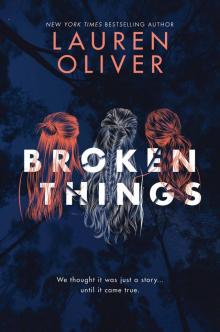 Broken Things
Broken Things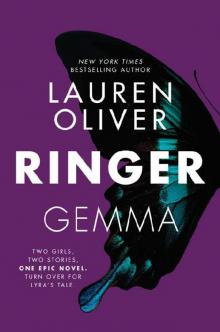 Ringer (Replica)
Ringer (Replica) Alex (delirium)
Alex (delirium)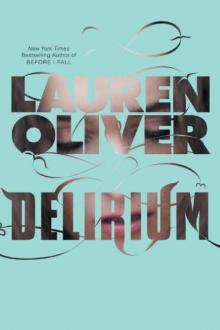 Delirium dt-1
Delirium dt-1